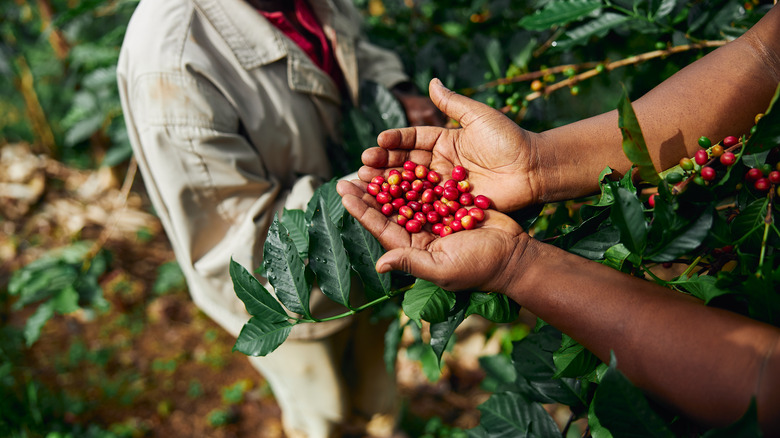Coffee Drinkers Just Received More Bad Inflation News
At this point in the inflation crisis, coffee drinkers have grown accustomed to ponying up a pretty penny for their morning caffeine fix — not to mention their ice cream fix, their ground beef fix, and their egg fix. According to data compiled for Mashed by the U.S. Bureau of Labor Statistics, the average price of a pound of coffee grounds in U.S. cities rose from $4.17 in October of 2019 to $5.79 in June 2022, representing a nearly 40% increase. Until recently, those wanting to name the obvious culprits of high coffee prices could point their fingers at increased labor costs, a crisis-level energy shortage affecting shipping, and severe weather in Brazil, the world's largest coffee producer (per Fortune).
Some products are finally seeing the light at the end of the inflation tunnel (good to have you back, broiler meat aka chicken), but ol' joe isn't one of them. Echoing a similar event from last summer, Bloomberg reports that a global coffee supplier based in Vietnam is seeing a major dip in its bean reserves.
Supply is down, demand is not
As the world's largest supplier of robusta (the bitter-tasting bean used widely in instant coffee and espresso blends that accounts for nearly 40% of the world's coffee supply), a coffee hiccup in the Vietnamese city of Ho Chi Minh can affect retailers around the world. In August 2021, the Delta variant of the coronavirus put a huge stall on Vietnamese robusta exports, resulting in a 50% increase in wholesale robusta bean prices (per BBC). Now, robusta producers are facing a different problem.
According to Bloomberg, the backup reserves of coffee beans that are typically hoarded in Vietnam in case of emergency have run dangerously low. On top of existing inflation concerns, robusta beans are getting higher price tags around the world as demand threatens to outweigh supply. The outlet reports that come September, Vietnam's robusta bank won't even meet half of last year's supply. After pushing through its Delta recovery, global robusta bean prices have surged 17% since mid-July. For now, robusta fans may want to switch to arabica.

